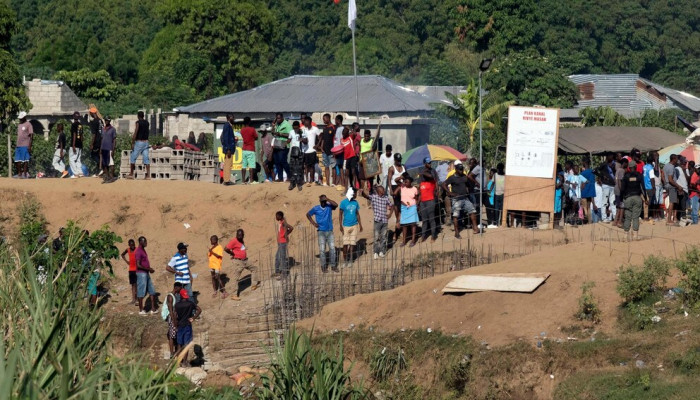Dominican Republic closes all borders with Haiti as tensions rise on island both countries share
- In Reports
- 11:26 AM, Sep 16, 2023
- Myind Staff
In a disagreement over the construction of a canal on Haitian soil that taps into a shared river, the Dominican Republic closed all land, air, and sea borders with Haiti on Friday. Armed Dominican soldiers patrolled entrance points while military aircraft rumbled overhead. Flights were canceled, and the normally bustling border towns where Haitians pass daily to work in the Dominican Republic were quiet.
The unprecedented border shutdown is expected to persist "as long as necessary," according to Dominican President Luis Abinader, but it is unknown for how long. The country's Ministry of Foreign Affairs declared that the canal project breached a 1929 convention and "must be halted immediately before pursuing any other dialogue."
Abinader ordered his administration to buy all perishable items, such as poultry, onions, beans, and eggplants, that are typically exported to Haiti. According to Joel Santos, minister of the presidency, the food will be utilized for government initiatives that provide free meals to people such as students and others.
“Producers should know that the government is going to support them in this situation because the measure taken by the president represents an issue of security and defense of national sovereignty,” he said.
The diplomatic tussle started earlier this month when workmen in Haiti restarted building a canal near the Massacre River, which runs along the border, in an effort to help the country's Maribaroux plain recover from a drought. The river was the scene of the mass murder of Haitians by the Dominican army in 1937 and bears the name of a terrible battle between Spanish and French colonizers in the 18th century.
As opposed to Haiti's government, which maintains that building the canal is within its sovereign right to select how to use its natural resources, Abinaderclaims that the canal will divert water, have a negative impact on Dominican farmers, and harm the surrounding ecosystem.
The closure will represent a significant economic hit for both countries that share the island of Hispaniola, although Haiti is expected to feel it more acutely.
“It’s really a very drastic measure that doesn’t make sense economically for either the Dominican Republic or Haiti,” said Diego Da Rin with the International Crisis Group. “This will clearly have very bad consequences economically in the Dominican Republic, and it will very likely worsen the humanitarian situation mostly in the areas close to the border.”
According to the Export and Investment Centre of the Dominican Republic, Haiti is the third-largest commercial partner of the country, with $1 billion in exports to Haiti and $11 million in imports made last year. Meanwhile, a study by the Dominican Republic’s Central Bank found that $430 million in informal border trade was conducted in 2017 between the countries. Of that amount, more than $330 million consisted of exports to Haiti.
Officials from the two nations met on Wednesday to address the matter, and they continued to meet on Thursday when Abinader declared he would seal all crossings on Friday. The Haitian government criticised this "unilateral" action, calling it unacceptable.
Da Rin called Abinader's actions an overreaction and noted that he confirmed last month he is running for re-election, and appeared to be staking out a tough stance on migration. “Maybe Abinader thinks this is a way to portray himself as a strong nationalist leader who will be the only one ... able to really stop the ‘Haitian invasion’ as he always calls the growing migration influx.”
Despite the reduced length of Thursday's enormous lineups, authorities continued to permit entry into Haiti on Friday.
On Friday, Haiti's Support Group for Returnees and Refugees condemned Abinader’s move and said the canal work should continue.
“Closing the border will bring big consequences for Haitian migrants,” coordinator Ketia Bronté said.
She warned that more people would enter the country illegally and that there would probably be an increase in the amount of human trafficking and illicit goods.“Haiti and the Dominican Republic are two nations whose history is intertwined,” she said. “Their destiny is linked to living together on an island.”
This Monday, Abinader made the announcement that he would no longer be giving visas to Haitians and would be closing the border crossing near Dajabon. Additionally, he has worked to stop the migration of Haitians to the Dominican Republic and has removed tens of thousands of them as well as those of Haitian heritage. Bronté said that about 22,000 Haitians were deported in August alone, which is twice the monthly average. The Dominican Republic also has started building a 118-mile (190-kilometer) wall along the Haitian border that he announced early last year.
Image source: AP







Comments